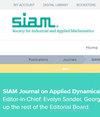A Geometric Singular Perturbation Analysis of Shock Selection Rules in Composite Regularized Reaction-Nonlinear Diffusion Models
IF 1.8
4区 数学
Q2 MATHEMATICS, APPLIED
引用次数: 0
Abstract
SIAM Journal on Applied Dynamical Systems, Volume 23, Issue 3, Page 2099-2137, September 2024.Abstract.Reaction-nonlinear diffusion partial differential equations (RND PDEs) have recently been developed as a powerful and flexible modeling tool in order to investigate the emergence of steep fronts in biological and ecological contexts. In this work, we demonstrate the utility and scope of regularization as a technique to investigate the existence and uniqueness of steep-fronted traveling wave solutions in RND PDE models with forward-backward-forward diffusion. In a recent work (see [Y. Li et al., Phys. D, 423 (2021), 132916]), geometric singular perturbation theory (GSPT) was introduced as a framework to analyze these regularized RND PDEs. Using the GSPT toolbox, different regularizations were shown to give rise to distinct families of monotone steep-fronted traveling waves which limit to their shock-fronted singular counterparts, obeying either the equal area or extremal area (i.e., algebraic decay) rules that are well known in the shockwave literature. In this work, we extend those earlier results by showing that composite regularizations can be used to construct families of monotone shock-fronted traveling waves sweeping out distinct generalized area rules, which smoothly interpolate between these two extremal rules for shock selection. Our analysis blends Melnikov methods—including a new variant of the method which can be applied to autonomous piecewise-smooth systems—with GSPT techniques applied to the traveling wave problem of the regularized RND model over distinct spatiotemporal scales. We further demonstrate using numerical continuation that our composite model supports more exotic shock-fronted solutions, namely, nonmonotone shock-fronted waves as well as shock-fronted waves containing slow tails in the aggregation (backward diffusion) regime. We complement these existence results with a numerical spectral stability analysis of some of these new “interpolated” steep-fronted waves. Using techniques from geometric spectral stability theory, our numerical results suggest that the monotone families remain spectrally stable in the “interpolation” regime, which extends recent stability results by some of the authors in [I. Lizarraga and R. Marangell, Phys. D, 460 (2024), 134069], [I. Lizarraga and R. Marangell, J. Nonlinear Sci., 33 (2023), 82]. The multiple-scale nature of the composite regularized RND PDE model continues to play an important role in the numerical analysis of the spatial eigenvalue problem.
复合正则化反应-非线性扩散模型中冲击选择规则的几何奇异扰动分析
SIAM 应用动力系统期刊》,第 23 卷第 3 期,第 2099-2137 页,2024 年 9 月。 摘要.反应非线性扩散偏微分方程(RND PDEs)最近被开发成一种强大而灵活的建模工具,用于研究生物和生态环境中陡峭前沿的出现。在这项工作中,我们展示了正则化作为一种技术在研究具有前向-后向-前向扩散的 RND PDE 模型中陡锋行波解的存在性和唯一性方面的实用性和范围。在最近的一项工作中(见 [Y. Li et al., Phys. D, 423 (2021), 132916]),引入了几何奇异扰动理论(GSPT)作为分析这些正则化 RND PDE 的框架。利用 GSPT 工具箱,不同的正则化被证明会产生不同的单调陡前行波系列,这些行波会极限到它们的冲击前奇异对应波,服从冲击波文献中众所周知的等面积或极值面积(即代数衰减)规则。在这项研究中,我们扩展了之前的研究成果,证明复合正则化可以用来构建单调冲击前行波族,扫出不同的广义面积规则,在这两种极端规则之间平滑插值,以进行冲击选择。我们的分析融合了梅尔尼科夫方法(包括该方法的一个新变体,它可应用于自主片状光滑系统)和应用于不同时空尺度上正则化 RND 模型行波问题的 GSPT 技术。我们通过数值延续进一步证明,我们的复合模型支持更奇特的冲击波前解,即非单调冲击波前解以及在聚集(后向扩散)机制中包含慢尾的冲击波前解。我们对这些新的 "插值 "陡前波进行了数值谱稳定性分析,以补充这些存在性结果。利用几何谱稳定性理论的技术,我们的数值结果表明,单调族在 "插值 "机制中保持谱稳定性,这扩展了[I. Lizarraga and R. Marangell, Phys. D, 460 (2024), 134069]、[I. Lizarraga and R. Marangell, J. Nonlinear Sci., 33 (2023), 82]中一些作者的最新稳定性结果。复合正则化 RND PDE 模型的多尺度性质在空间特征值问题的数值分析中继续发挥着重要作用。
本文章由计算机程序翻译,如有差异,请以英文原文为准。
求助全文
约1分钟内获得全文
求助全文
来源期刊

SIAM Journal on Applied Dynamical Systems
物理-物理:数学物理
CiteScore
3.60
自引率
4.80%
发文量
74
审稿时长
6 months
期刊介绍:
SIAM Journal on Applied Dynamical Systems (SIADS) publishes research articles on the mathematical analysis and modeling of dynamical systems and its application to the physical, engineering, life, and social sciences. SIADS is published in electronic format only.
 求助内容:
求助内容: 应助结果提醒方式:
应助结果提醒方式:


